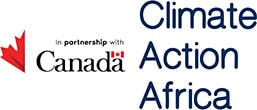Enhancing National Climate Adaptation Policies and Financing through the Broadened WEF+ Nexus
Context:
This Climate Action Africa initiative was made possible through funding from Global Affairs Canada for a South-South Exchange in partnership with the University of KwaZulu-Natal.
Global challenges like climate change, population growth, overuse of natural resources, and urbanization are increasing pressure on water, energy, and food supplies. These sectors are closely connected, meaning actions in one area impact the others. To address this, the Water Energy and Food (WEF) Nexus Nexus approach promotes an integrated view of managing these resources together, considering environmental and human health factors.
In southern Africa, development depends heavily on natural resources, making the WEF Nexus approach vital. It focuses on balancing water, energy, and food security while ensuring environmental sustainability and improving human health. This approach aligns with global initiatives like the Paris Agreement and the Sustainable Development Goals (SDGs).
Southern African Development Community (SADC) countries are working to integrate the WEF Nexus into their climate plans, called Nationally Determined Contributions (NDCs). These plans are updated every five years to the United Nations Framework Convention on Climate Change (UNFCCC) secretariat to reflect progress and adapt to new climate challenges. However, many SADC countries face difficulties addressing climate change and securing funding for WEF projects.
As SADC countries prepare for the next NDC submissions in 2025, they can adopt new and cost-effective technological solutions, such as renewable energy, and strengthen their efforts to meet water, energy, and food security goals. Understanding the UN climate process and improving the capacity to implement these strategies are key to building regional climate resilience.
Participant countries: Southern African Development Community (SADC) – Angola, Botswana, Comoros, Democratic Republic of Congo, Eswatini, Lesotho, Madagascar, Malawi, Mauritius, Mozambique, Namibia, Seychelles, South Africa, United Republic of Tanzania, Zambia and Zimbabwe.
Venue: Pretoria, South Africa
Goal:
The workshop’s goal was to address the challenges of integrating the Water-Energy-Food (WEF) Nexus into national policies and to facilitate access to climate finance for related investments.
Objectives:
The workshop aimed to build effective WEF Nexus planning capacity, including integrating WEF Nexus issues into Nationally Determined Contributions (NDCs). It also sought to promote peer-to-peer learning and create a community of practice focused on WEF security. The specific objectives included:
- Supporting SADC Member States in incorporating the WEF Nexus approach and environmental and health considerations into national policies, particularly NDCs, to boost resilience and reduce climate risks.
- Providing training on accessing climate finance from various sources, exploring the links between National Determined Contributions (NDCs), Global Stocktake (GST), and Enhanced Transparency Framework (ETF), and preparing and submitting proposals.
- Facilitating cross-country learning and collaboration to share lessons and best practices on national policy development, including the recent COP28 UAE Declaration on Climate and Health, which directly addresses energy, water, and agriculture in cross-sectoral adaptation planning.
Summary of Exchange:
The training workshop was held at the SADC Secretariat from April 22 to 26, 2024.
The member states’ UNFCCC focal persons for in-person training focused on integrating the WEF nexus into climate change planning for implementing NDCs and accessing climate finance. Experts from various institutions provided hands-on learning, learning materials, and exercises related to the areas. Following positive feedback on the training, participants requested a follow-up session on accessing climate funds.
The University of KwaZulu-Natal organized the workshop in collaboration with the Southern African Development Community (SADC)-Food, Agriculture and Natural Resources (FANR) Directorate, UNFCCC Climate Action and Support Transparency Training (CASTT) Adaptation Academy, IHE Delft Institute for Water Education, the London School of Hygiene and Tropical Medicine, Alliance for Global Water Adaptation (AGWA), Water Research Commission of South Africa, Nexus Gains and Global Water Partnership to address the specific challenges faced in integrating WEF Nexus into national policies and facilitate access to climate finance for investments.
Outcomes
Participants at the workshop were able to:
Summarise the hazards and risks for key sectors associated with a changing climate at local, regional, and global levels and approaches to combating these hazards and risks.
- Understand the differences between natural climate variability and anthropogenic climate change.
- Understand current and projected climate trends based on recent Intergovernmental Panel on Climate Change (IPCC) reports.
- Outline and discuss the major approaches to climate change mitigation and adaptation, emphasising adaptation.
Review the goals of the Paris Agreement and its intention:
- Discuss the consequences and obligations for signatory countries, including the arrangements under the Enhanced Transparency Framework (ETF)
- Understand key elements of a Biennial Transparency Report (BTR)
- Recognize links among National Determined Contributions, National Adaptation Plans and Communications, and ETF components, including reporting on adaptation information.
Strengthen the capacity to inform vulnerability and adaptation assessments for their own country and context through a broadened WEF+ Nexus perspective:
- Characterise and describe tools and approaches for assessing vulnerability and adaptation across the water, energy, food, environment, and health sectors.
Analyse specific NDCs (of selected countries) in the context of trade-offs and synergies between water, food and energy (including environment and health) in adaptation and mitigation plans. - Recognise associated gaps or lack of policy coherence and implementation arrangements at regional and national levels and the consequences for NDCs and National Adaptation Plan (NAPs).
- Understand trade-offs between national water, energy and food (including environment and health) ambitions in climate change adaptation.
Distinguish between and apply different financing options to support climate adaptation approaches, including the NDCs.



